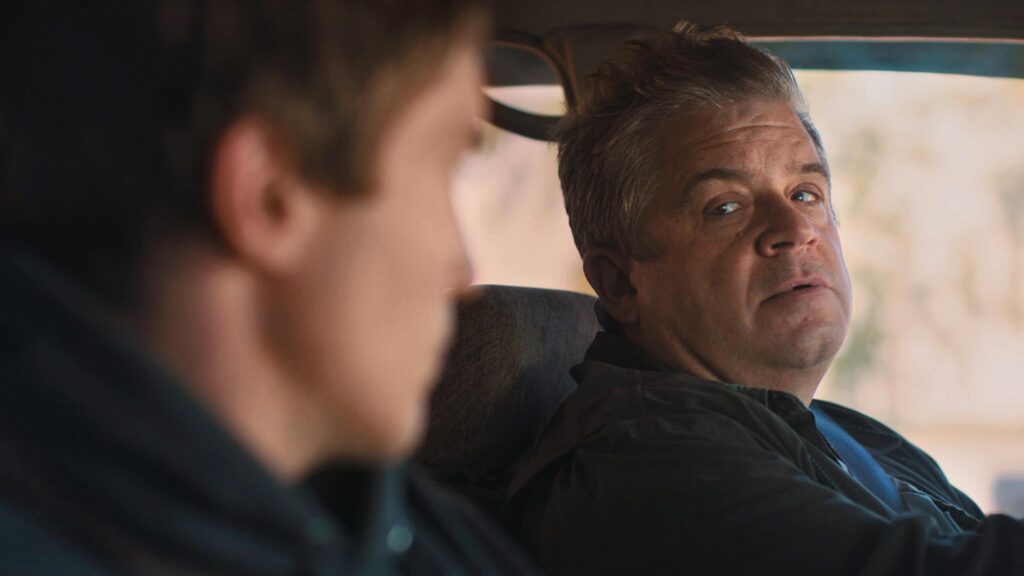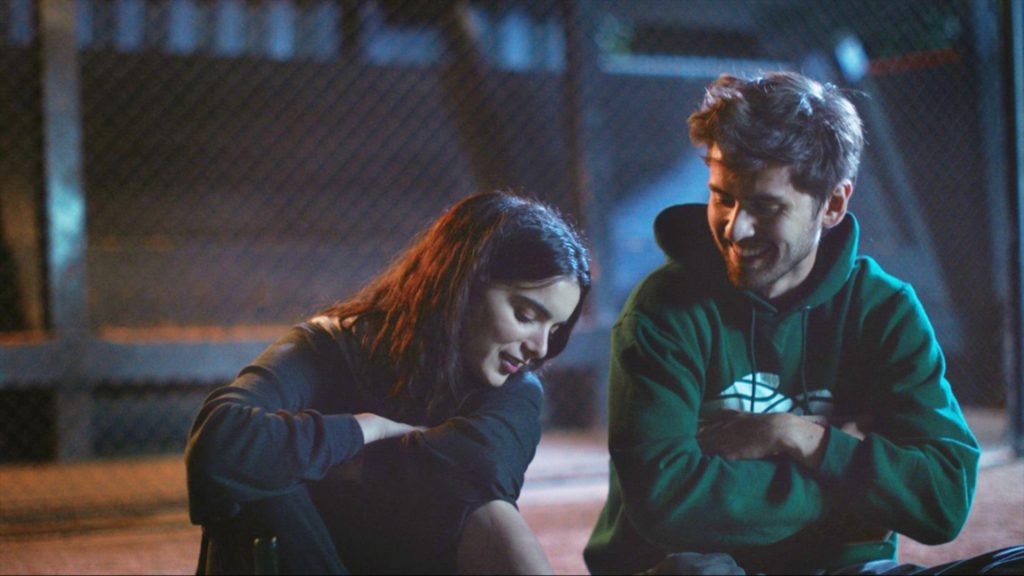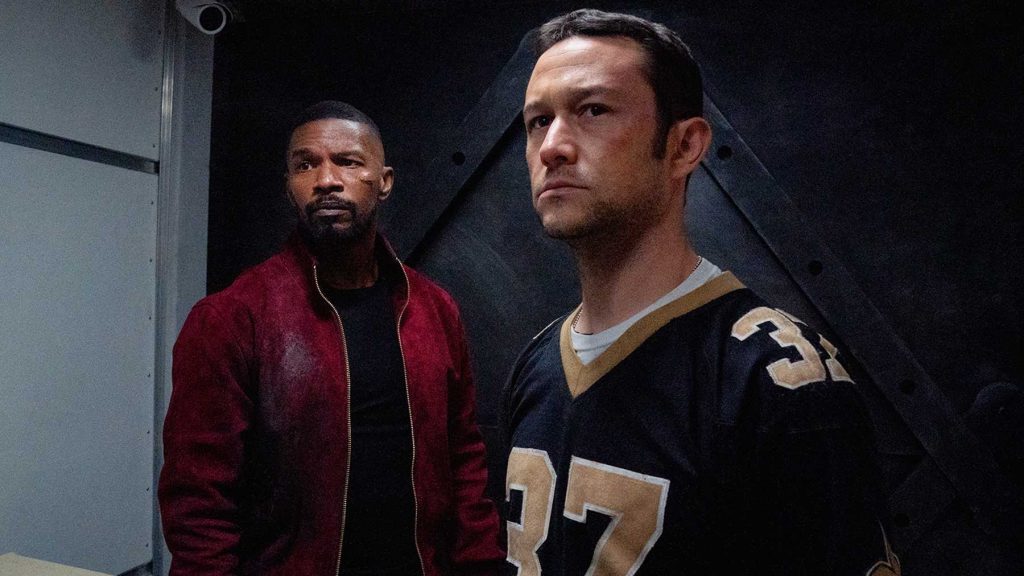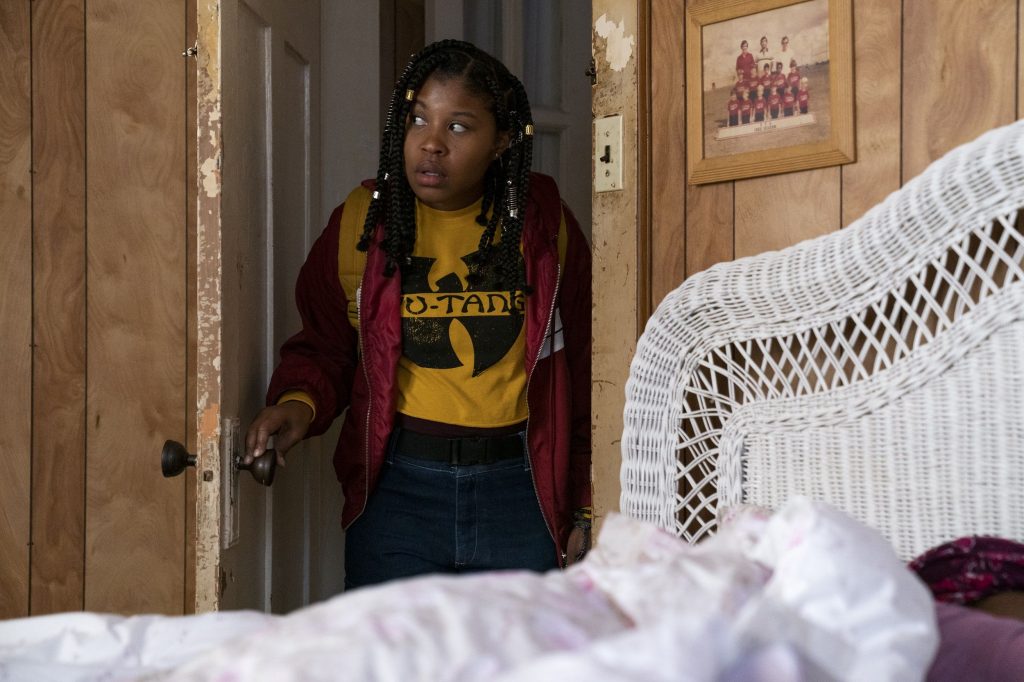January 20, 2023
by Carla Hay

Directed by Will Merrick and Nick Johnson
Culture Representation: Taking place in 2022, in the Los Angeles area and in Cartegena, Colombia, the dramatic film “Missing” (a spinoff of the 2018 film “Searching”) features a racially diverse cast of characters (African American, white, Asian and Latino) representing the working-class and middle-class.
Culture Clash: An 18-year-old woman who lives in Van Nuys, California, goes on a frantic search (mostly on her computer and phone) to find out what happened to her mother and her mother’s boyfriend, who both disappeared during a vacation trip to Cartegena, Colombia.
Culture Audience: “Missing” will appeal primarily to people who are fans of “Searching” and who are interested in fast-paced mystery thrillers.

“Missing” somewhat devolves into climactic scene clichés in the movie’s last 15 minutes. The rest of “Missing” is an absorbing and occasionally implausible twist-filled thriller about how technology can be used to solve mysteries. “Missing” is a spinoff movie of 2018’s “Searching” (about a father who uses computer technology to search for his missing teenage daughter), and “Missing” has some clever ideas and surprises that aren’t in “Searching.” However, the ending of “Missing” is a little too close to copying the ending of “Searching,” by playing too fast and loose with perceptions about the life or death of the missing person.
Will Merrick and Nick Johnson wrote and directed “Missing” (which is the feature-film directorial debut of Merrick and Johnson), after the duo served as editors of “Searching.” Aneesh Chaganty and Sev Ohanian, who co-wrote “Searching,” are credited with the story concept for “Missing” and are two of the producers of “Missing.” Chaganty made his feature-film directorial debut with “Searching,” which showed most of the father’s investigation happening on various computer screens and smartphone screens.
“Missing” follows a similar format of having most of the investigation shown on computer screens and smartphone screens, but “Missing” flips the script of “Searching”: Instead of a parent looking for a teenage daughter, “Missing” has a teenage daughter looking for a parent. In the case of “Missing,” this daughter has no other family members who can help her in this search.
“Missing” begins by showing a family home video from April 13, 2008, during what will be the family’s last trip together. James Allen (played by Tim Griffin) is on a kitchen floor with a kitten and his daughter June Allen (played by Ava Lee), who’s about 4 yearsold and who has the nickname Junebug. It’s a lighthearted family moment until June’s mother (played by Nia Long) notices that James has gotten a nosebleed.
The movie then shows that someone is looking at this home video in 2022: June Allen (played by Storm Reid), who is now 18 years old. It’s June 2022, and June has been looking sadly at this video because her father died in 2008, and Father’s Day is coming up in less than two weeks. June lives with her overprotective mother Grace Allen in Van Nuys, California, a suburb of Los Angeles. June has recently graduated from high school, and she doesn’t have any big plans for the summer.
This year will be the first year that June won’t have Grace nearby on Father’s Day. That’s because Grace is going on a romantic vacation trip to Colombia with Grace’s fairly new boyfriend Kevin Lin (played by Ken Leung), who is the CEO of a start-up company called All-Brand Consulting. The movie later reveals that Kevin and Grace met through a dating app. June’s relationship with Kevin is emotionally distant, and he’s been making attempts to get her to accept him because he says he’s in love with Grace and expects to be in a long-term relationship with her..
June is looking forward to having the house to herself and no adult supervision during Grace and Kevin’s weeklong vacation in Cartegena, Colombia. June has been tasked with picking up Grace and Kevin from Los Angeles International Airport on June 20, 2022. Grace has left behind some spending money for June, who ignores Grace’s complaints that June’s voice mailbox is full and needs to be cleared. June sometimes gets frustrated or amused when her mother gets confused by how to use a smartphone, such as when Grace mixes up using FaceTime with using Suri.
Even though June is dependent on Grace for nearly every necessity in life, June is at an age where she resents being treated like a child. Grace has asked her close friend Heather Damore (played by Amy Landecker), who’s a well-meaning and inquisitive attorney, to check in on June while Grace is away. June, who doesn’t really care for Heather, says with annoyance: “Mom, I don’t need a babysitter!” June also gets very irritated when Grace calls her Junebug, because June thinks that she has outgrown this childhood nickname.
While her mother is away, June spends a lot of time partying with friends, including her best friend Veena (played by Megan Suri), who has bought alcohol by using money that June gave her from the amount that Grace left behind. Montages of photos on Kevin’s social media show that he and Grace are having a lot of fun in Colombia. When it comes time to pick up Grace and Kevin from the airport, June almost oversleeps.
June has let the house become a mess, so she quickly uses Taskrabbit (an app for temporary workers) to find a housecleaner to tidy up the house before Grace gets home. Taskrabbit is shown and talked about enough times in the movie, it’s a little bit of overload on brand placement. When Grace gets to the airport, Kevin and Grace aren’t there. Grace and Kevin also aren’t responding to any attempts to communicate with them.
Feeling worried and confused, June calls Hotel Poma Rosa, the place where Grace and Kevin were staying in Cartegena. Her concern turns to alarm when she finds out that Grace and Kevin were last seen leaving the hotel two days ago, but they left behind all of their belongings. June knows a little Spanish, but she is able to communicate better in Spanish by using Google Translate. The front-desk clerk who talks to June on the phone says that the hotel has video surveillance for the main front entrance, but after 48 hours, the video gets recorded over.
By now, Grace’s friend Heather and June’s friend Veena have joined in on the frantic search. Through her attorney connections, Heather has contacted the U.S. Embassy in Columbia to file a missing persons report. The FBI has assigned an agent named Elijah Park (played by Daniel Henney) to lead the investigation, but he warns June that the FBI doesn’t have jurisdiction for certain crimes in Colombia. First, the FBI has to find out if any crimes have been committed in this missing persons case.
The FBI can’t guarantee that someone can be sent in time to look at the hotel’s video surveillance footage. And so, June takes it upon herself to use Taskrabbit to find a local person in Cartegena to do it for her. She ends up hiring a compassionate and resourceful middle-aged man named Javi (played by Joaquim de Almeida), who becomes a valuable aide in many things that June asks him to do in the search. It’s explained in this “race against time” movie that June can’t go to Colombia herself because she’s finding out important things at such a rapid pace, getting on a plane to Colombia would slow down her investigation.
Much of June’s investigation involves Internet searches and video phone calls, but the tension is ramped up by quick-cutting editing, so that looking at all these computer screens doesn’t get boring for viewers of the movie. Just like in “Searching,” the more the protagonist investigates, the more information is revealed to expose certain secrets. “Missing” keeps viewers guessing until a certain point if Kevin is a victim of foul play, or if he had something to do with Grace’s disappearance. And just when it looks like the movie will go one way, it goes another way, until the last (very predictable) 15 minutes.
All of the cast members give watchable performances in “Missing,” with Reid offering a very realistic and empathetic portrayal of June. She carries the movie quite well in expressing the myriad of emotions and experiences that June has in the story. Most of the other characters in the movie are somewhat generic, except for enigmatic Kevin. Leung skillfully handles this role that viewers and some of the movie’s characters can’t quite figure out up until a turning point if Kevin is a “good guy” or “bad guy.”
“Missing” also credibly depicts the obstacles faced by a teenager looking for a loved one who’s disappeared, since some people don’t take June as seriously as they would if she were a much older adult. It’s why it looks very believable that tech-savvy June would want to take matters into her own hands instead of waiting for law enforcement officials who’ve already shown and told her that they’re very busy with other things. Even with June’s believable “take charge” attitude, there are still some hard-to-believe moments in “Missing,” which uses lot of the quick-cut editing to mask some very improbable occurrences that happen much quicker in the movie than they would happen in real life.
And woe to anyone watching this movie who’s computer-illiterate, because some of the computer terminology and functions in this movie will just be too confusing for people who aren’t familiar with the apps and gadgets shown in the movie. Conversely, “Missing” is so reliant on showing computer technology of 2022, this movie will eventually look very dated. (“Missing” also has inside references to “Searching,” including a scene where June watches a true crime show called “Un-Fiction,” which has an episode with recreations based on the case that was in “Searching.”) There’s nothing award-worthy about “Missing,” but it’s still very entertaining for anyone who wants to spend nearly two hours watching an intriguing mystery film.
Screen Gems released “Missing” in U.S. cinemas on January 20, 2023.






